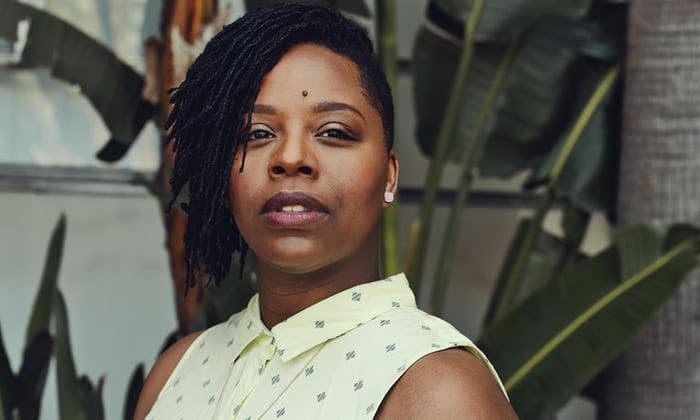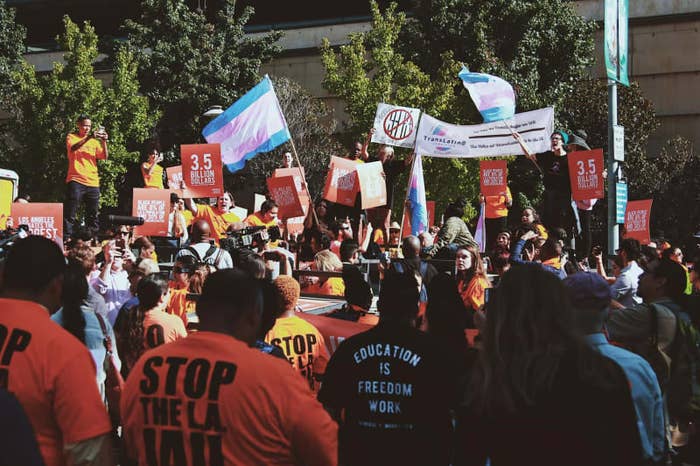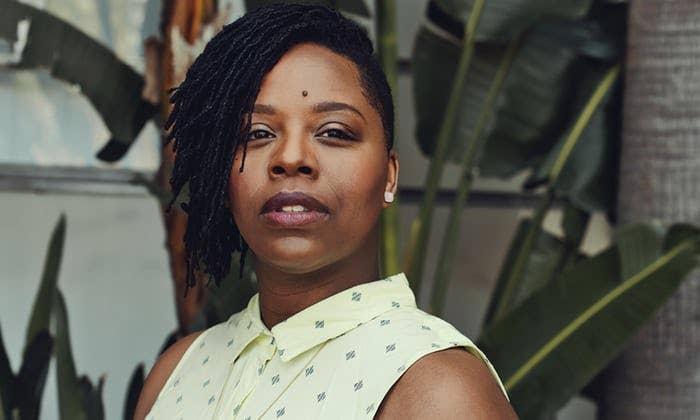
In August of 2017, a leaked report from the FBI's counter-terrorism unit identified a new group of domestic terrorists: Black Identity Extremists. The issue with this designation, of course, was that it essentially labeled Black activists—like those involved in the Black Lives Matter movement, who non-violently protest systemic racism and seek to end the unjust murder of Black people by police—a danger to public safety.
In a post-Obama world where disgruntled white men marching with tiki torches elicit sympathy while black men quietly kneeling are the source of not-so-quiet rage, it's a particularly troubling example of targeting civil rights leaders, and moreover, attempting to squelch anyone who openly advocates for the rights of Black people.
As one of the co-founders of Black Lives Matter, no one understands the depth of that hypocrisy than Patrisse Cullors. The title of Cullors' forthcoming memoir, When They Call You a Terrorist: A Black Lives Matter Memoir, is drawn from the many times Cullors, along with fellow co-founders Opal Tometi and Alicia Garza, have been labeled as members of a hate group—and yes, even terrorists—by the alt-right and, as of this summer, by the U.S. government itself.
None of this has deterred Cullors. If anything, it's only buoyed her hope and resolve. We caught up with Cullors just after she led a rally for her newest initiative, JusticeLA—which seeks to “reclaim, reimagine and reinvest what L.A. County could do with the $3.5 billion allocated to building two new jails”—to talk about the LAPD's fraught relationship with the Black and Latino community, Colin Kaepernick's growing role in BLM, and how to deal with closeted racists.
Your upcoming memoir, When They Call You a Terrorist: A Black Lives Matter Memoir, will be released in January 2018. What made you decide to tell your story now?
I decided to share my story because I wanted to provide a new narrative for queer Black women raised poor and living in Los Angeles. There was a necessity for me to remind people of the atrocities of the war on drugs and war on gangs. To give people a fuller version of the impact the militarization of law enforcement had on poor communities. I wanted people to see Black women as integral to the fight against mass incarceration.
You’ve recently helped create JusticeLA to halt proposed plans to spend $3.5 billion to build two new jails in Los Angeles County. What role do you personally play in the project, and what is your primary hope for what those funds could accomplish if reallocated?
I helped develop the project and initiated the coalition—there are over 38 organizations that are a part of it. The lead coalition members are Dignity and Power Now, a local grassroots organization that has been doing a lot of amazing work around challenging the issues of jail violence. We also have YJC [Youth Justice Coalition], which is a youth-led organization. We just got a union that joined the coalition, so the role I play is coordinator—bringing people together to challenge the 3.5 billion dollar jail plan and reallocate that money into community-based solutions.
What would that look like, those solutions?
The county of Los Angeles has about 17,000 prisoners; 80% of those prisoners are Black and Latino. So we are looking at who is in the county jail and who is being directly impacted. Up to 60% of those people are inside LA county jails only because they are poor; they have not been convicted of any sort of crime. So what we are saying is the county will be investing a significant amount of money in a population that’s most vulnerable, and instead that money can be used towards mental health care facilities, job creation, and the houseless and homeless population. If we spent more time thinking and working with community partners we could actually develop out a participatory budget that is investing its dollars inside of mostly poor Black and Latino communities.

So the goal is then is to put money into the community itself and into keeping people out of jails rather than simply investing in the jails themselves.
Yeah. We have to look who is inside of jails and then why they are inside of jails. Then we have to ask the question which every society should be asking: What’s the root cause? Why are people doing what they do? Whether it is stealing from a grocery store, writing out a fraudulent check, or harm and violence, we have to have a more innovative and imaginative conversation about the root causes, and then we have to decide as a county how we want to deal with it.
We can’t jail ourselves out of these problems, but what we can do is get people access to jobs so they’re not stealing. What we can do is get people the proper mental health care services, whether that’s services for PTSD or severe mental illness so we have less harm and violence. We can get people access to a home so that we can have the bodies on the streets of Los Angeles off of the streets. They are very simple answers, but the question for our county is, “Do you want to do it?”
There is a lot of damaging misinformation around why so many Black people are incarcerated, and that misinformation plays a large part in perpetuating negative stereotypes and racism generally. What can we do to set the record straight?
I think we need to have more and more frank conversations about who is languishing inside of the jails. In Los Angeles, Black people make up 8% of the population, but we make up 30% of the jail population. The question becomes why—what are Black people doing? Are we more inclined to criminality? No, but our everyday lives are criminalized.
If you look at the neighborhoods where Black people are living, police spend the most of their time patrolling those neighborhoods. If you look at Black people’s ability to having access to housing, access to food, access to livelihood, that is diminished in many poor Black neighborhoods and we know what happens when people don’t have access to particular things. Folks are trying to survive, and are we criminalizing people for trying to survive? Yes. So when it comes to Black people inside jails and prisons being impacted by mass criminalization, we can’t blame victims. Sure, people have their own personal responsibility, but at the end of the day there are systems in place that continue to disenfranchise Black communities in particular.
LAPD has such a long and complicated history with communities of color. In what ways do you see the effects of the 1992 riots still lingering in LA today?
LAPD has such a complicated history inside of Los Angeles. Pre-Rodney King, we have seen a significant amount of police brutality and Black folks had pretty much felt completely unsafe with LAPD. The Rodney King beating and subsequent uprising exposed an LA that was deeply traumatized and incredibly rageful about what had happened to them, a Black LA.
We fast forward to 2017 where not only is it LAPD, but it’s also the LA sheriff’s department. Many don’t understand the kind of structure and which law enforcement is in charge of what, but the LA sheriffs are in charge of the county jail. In the last decade, the county jail has been under serious scrutiny, so much so that the FBI came in and launched a secret investigation, and now we have the former undersheriff and sheriff doing prison time and others on their way to prison. So the corruption inside LA, not just with LAPD but the Los Angeles Sheriff’s Department, has been so visceral. Part of the work of JusticeLA is to remind people that this county has had a history of violence and trauma, not just by one department but by multiple.
Trumps has seemed to—on several occasions—outwardly endorse police brutality policies. What direct effect does that have on our nation and the safety of Black people?
I think when we heard 45 [note: Cullors refuses to say Donald Trump’s name in public, referring to him only as “45.” She explains why in this interview] speak those words against Black people [and] in favor of police brutality, it became a clarifying moment that not only 45 is deeply invested in a law and order state, but also deeply invested in police violence. What was clear for us, and what should be clear for Americans across the country, is that this president will not provide safety. This president is invested in disorganization and chaos and in harming and perpetuating harm in Black communities.
Fifty-four percent of Black youth have been harmed by police or know someone who has. Seattle Seahawks defensive lineman Michael Bennett called you when he was unjustly detained by Las Vegas police. What did you say in that moment? What kind of advice do you give to POCs who constantly deal with the dangers of law enforcement?
What I would say is, you live in a country that has a long-standing history of creating environments where Black people aren’t safe. The best way that you can live inside this country is to know what you are up against, know that I can’t protect you and many of us can’t protect you until this country changes. And we’re seeing that time and time again, we can try and tell Black folks what to do to keep themselves safe, but at the end of the day law enforcement has shown themselves to have an implicit bias, have shown themselves to fear Black people for no other reason than because they’re Black. And I think that’s important to name so we don’t give people false hope. I’m close to Michael Bennet and he called me after the situation said “Man, at the end of the day I’m still just Black to them. That’s what they see.” And I think that’s really important.
To your point about implicit bias, there was a Harvard study that found many people have unconscious biases against Black people, even Black people themselves. What do you think we can do to combat hidden biases? What kind of fail-safes can we can put in place to protect POCs from police biases—and even protect police from their own biases?
It’s a complicated and tricky question. One would ask, is it true to see Black people as people who may be criminalized? They will say no, it’s not, but that’s not true—they have racial profiling. I don’t know if the answer is retraining officers; I think the question and answer are something completely different. What kind of country do we need to live in to actually feel safe in it? What kind of government do we need to feel safe? What are we investing in?
We need to do an entire reimagining of public safety. What we have lived under is that public safety is a gun, a badge, a courthouse, and a jail cell—that’s what keeps us safe. What I would argue is that is what provides disorganization and chaos. What keeps us safe is when people have access to their human rights and human needs; when people can go home and know they can see their children; when people have a job that provides a living wage. I think we need to be asking new questions about this moment and what safety actually looks like.
Do you think the inaction of the president in outwardly condemning supremacists has encouraged them? And in what ways have you seen that?
Not only has it encouraged them‚ it’s emboldened them and it’s allowed for them to have more space and weight in the cultural conversation. I’m thinking of the free speech rally that almost happened with Milo Yiannopoulos. We’re in a moment where white nationalists can go to Berkeley, which is supposed to be a haven for the movement, and do a free speech rally. I think that speaks to the very challenge that we’re up against.
As a white-passing Latina woman, I sometimes feel I don't have the right to be in the conversation or to care as deeply about it as I do. What would you say to people, either Latino or queer or otherwise who are wondering if they have a place in the movement?
BLM is a movement for everybody. BLM is a re-humanizing project. This is a movement asking everybody to show up and for people to be courageous. It isn’t just about Black people, because if it was we wouldn’t win. It is about changing the very fabric of America and bringing as many people together as possible. We always say that when Black people get free, we all get free.
What is the most meaningful thing allies—white, Latino and otherwise—can do to support BLM?
I think the most meaningful things allies can do to support BLM is build a relationship with your local organization, whether that is a BLM chapter [note: “Black Lives Matter” is frequently used to refer to both the overarching movement for Black lives and the specific organization of that name. Cullors is here specifically referring to the latter] or another Black-led organization. See if you can volunteer and provide networking and resources to these organizations. A lot of times people think, “Well those people are doing it, we don’t have to do anything.” I would say join the fight. I think that can be really powerful.
Online in particular, woke shaming is a thing, for both POCs and non-POCs. Not getting the wording right, language policing, poking fun at people who are not fully understanding the issue. How can we help better inform people without alienating them?
It’s hard. Woke-shaming is really unfortunate. If we are trying to build a movement to save all of us, we need to be able to invoke faith in people who are new, who are learning, and who are willing to grow. There is a difference between people who are bigots and people who are trying to figure out their way in this. We should have patience.
Perhaps one of the most terrifying aspects of Trump's presidency is that it's encouraged closet racists to come out. Sometimes it's even the people closest to us, our family and friends. What advice would you give to someone who's discovered someone close to them is racist? Avoid them altogether, or try to teach them?
If you have family who voted for Trump, is overtly racist or a closeted racist, it’s your duty to talk to your family and be in conversation with them about their behavior and what they believe and really challenge them to see the diversity of what is out there, and to grow. It’s not going to take one conversation. This could take many, many years.
All of these white supremacists—even if we get a president that actively fights against structural racism, they don't go away. What’s the solution there? Do you believe racists can change their minds?
It depends. Anyone can have their mind changed. There are many high-profile former KKK members who lived a terrible life and have done terrible things to people and over time realized, “I don’t want to be this.” We have to give humans room to grow.
A recent poll showed that 27% of African Americans would like to see Colin Kaepernick lead BLM. Can you see him playing a larger role in the movement going forward?
Colin Kaepernick is one of the leaders in the movement for Black lives. His role as an athlete and activist is not only motivating, but inspiring. He is already playing such a powerful role in our movement.
Do you think taking a knee is watered-down form of protesting? Is kneeling enough?
No, it is not enough, but it could be the beginning. It could be really powerful when somebody like Colin Kaepernick and big-time professional athletes are lending their celebrity to protest one of the most violent governments we have ever seen.
Four years after BLM was founded, how do you measure the impact of BLM? Do you have benchmarks for progress?
Over the past four years, we have been able to literally change the culture of America. Four years ago, people weren’t talking about race as a conversation that many people should we having. We have changed that. We’ve allowed for people to talk about race and the impact it has on them. We’ve also lived in a country that was in denial of state violence and law enforcement violence. It used to be, police got to tell the story and now Black people are telling their narratives. BLM has really positioned a new conversation around criminal justice reform.
In a recent interview, Ta-Nehisi Coates said he said that while he feels BLM has been “tremendously effective,” that “nothing feels like it’s changing.” I think many people would agree. How would you address this sentiment?
Ta-Nehisi Coates is right. Police are still killing communities, Black communities, in particular, are dying and law enforcement isn’t being held accountable. What I think is important about this moment is our movement is committed to changing the very fabric of America. We are invested in supporting Black leadership and developing new ways to create the leaders we need to change the tragedies happening under a white supremacist government.
Can you envision a time where the need for BLM won’t be there?
I can imagine it, but I think it will be a long way from now.

